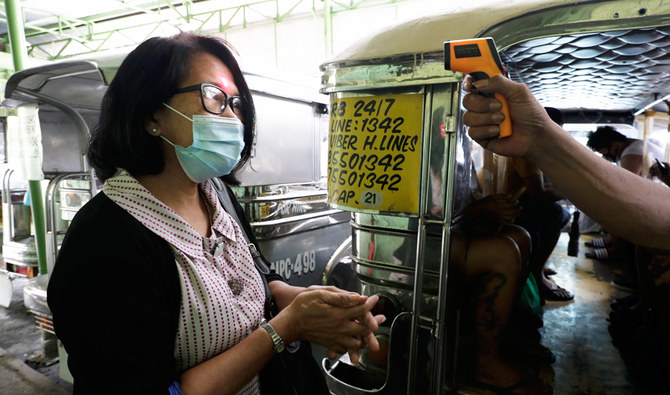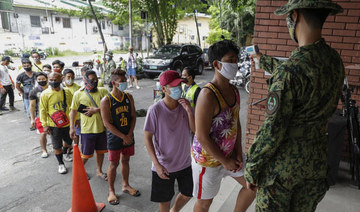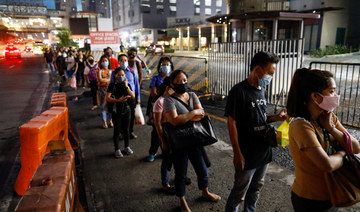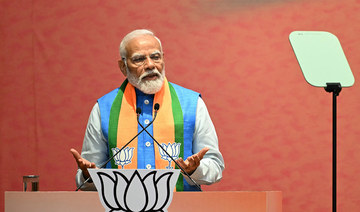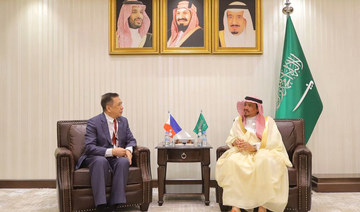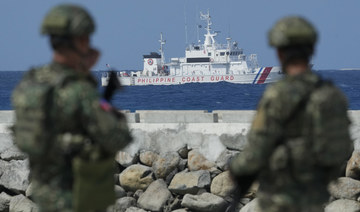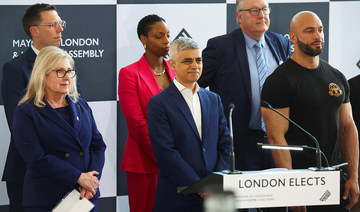MANILA: President Rodrigo Duterte has ordered a reimposition of a strict quarantine status in the country’s National Capital Region (NCR) and surrounding provinces.
This follows an urgent appeal made by the country’s health professionals to put Metro Manila back under enhanced community quarantine (ECQ) for the next two weeks, which will be used as a “timeout” to refine the government’s pandemic control strategies, warning that the country’s health care system was on the brink of a collapse.
Instead of an ECQ, however, Malacanang spokesperson Harry Roque said the President has “reverted the NCR, and the provinces of Laguna, Cavite, Rizal and Bulacan to modified enhanced community quarantine (MECQ) effective midnight Aug. 4 as recommended by members of his Cabinet.” This will run through Aug. 18.
Duterte earlier in the day met with key members of his Cabinet to discuss an urgent appeal by medical groups to put Metro Manila back on strict lockdown, warning that the country’s health care system was on the brink of a collapse.
On Saturday, medical associations sent a “distress signal to the nation,” saying: “Our health care system is overwhelmed.”
“Our health care workers are sounding a distress call. We need a short breather; we are already exhausted,” Jose Santiago, Philippine Medical Association president, said as he read out a joint letter on behalf of the medical groups during a virtual press conference.
“We have witnessed a consistent rise in the number of infections and these among other scenarios prompts us to act now and act fast,” it added.
“We are in a losing battle against COVID-19, and we need to come up with a consolidated plan. Hence, we, as frontliners dedicated to win the battle against COVID-19, call on our government to put Mega Manila back to Enhanced Community Quarantine (ECQ) for a period of two weeks, from Aug. 1 to 15,” the letter said.
Santiago said that “health workers are burnt-out with the seemingly endless number of patients” at hospitals.
A return to ECQ, he added, would also give an opportunity for the government to discuss strategies with the medical community.
In response, Roque announced on Saturday that the president had “heard the concerns of the medical community and the chief executive has directed the Inter-Agency Task Force for Emerging Infectious Diseases (IATF-EID) to act on these concerns immediately.”
“The Palace considers our skilled, tireless and dedicated health care workers as important frontliners in the battle against COVID-19. We are grateful for their immense contributions to heal our people and our nation during these difficult times. Your voices have been heard. We cannot afford to let down our modern heroes. This is our commitment,” he said.
Heeding Duterte’s directive, Executive Secretary Salvador Medialdea convened a meeting on Saturday night and were to submit their recommendations to the president on Sunday.
Aside from reverting to MECQ, Roque said the president also agreed to the distribution of 20 million facemasks to the poor, and the hiring of additional health care workers to augment the current workforce, including the hiring of 10,000 medical professionals and the calling to active duty and enlistment to the Armed Forces of the Philippines .
Health care workers would also be provided additional benefits, such as risk allowance for private sector health care workers treating COVID-19 patients, life insurance, free accommodation, free transportation, and free and frequent testing.
Also approved was the Cabinet’s recommendation to issue work and quarantine passes to minimize movement, while local government units are directed to intensify the localized lockdown strategy.
The guidelines for minimum health standards will also be strictly enforced and intensified, while use of RT-PCT testing as gold standard has likewise been approved.
he total number of COVID-19 cases in the Philippines crossed the 100,000 mark on Sunday, according to the latest data released by the Department of Health (DOH) which showed a record high of 5,032 new infections, taking the nationwide total to 103,185, six months after the first coronavirus case was reported in the country.
According to the health department, Metro Manila or the National Capital Region (NCR) accounted for the highest number of new COVID-19 cases, with 2,737 infections reported.
Meanwhile, the total recoveries also increased to 65,557 with 301 reported during the day. The death toll, on the other hand, increased 2,059 as 20 more people died from the disease.



